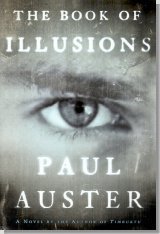The Ghosts of Future Books

For weeks I walked into my condo and would see the eyeball eyeballing me on the kitchen counter. Of course I had to finish Our Game before I could open it. I found this book in Barnes & Noble on one of their clearance tables; I think my sister had to buy 2 books so I could get it for $3.33.
Now, every time I get in my car I notice the paperback copy of The Good Earth stuck in the door pocket. It doesn't have an eye ball on its cover, but it's eyeballing me none-the-less...
Today, I had a stress-echo test for my heart. As I waited, I read The Book of Illusions. Hector Mann abandoned his sweetheart in Spokane and flew into the arms of a Chicago whore... Of course the sweetheart was the sister of the sweetheart his fiance had shot in the eyeball.
The receptionist at the "heart center" came out and told me about the magazines, the brochures, the whatnot. I told her I'd brought a book. She asked me about it. I had to tell her about buying it for $3.33 - but I told her I felt guilty because I was enjoying it so much. That maybe I would buy it for somebody for Christmas, so I could pay full price for at least one copy. I told her it was about a two-reel silent film star that disappeared from Hollywood in 1929, about what had happened to him; how Paul Auster had spent one chapter describing the 11 or 12 silent movie's Hector had made, and how he'd done such a good job of evoking a silent movie feeling... How, supposedly he'd gone on to make more (presumably silent) movies, and how I was looking forward to getting to see them... She asked me if it was a true story. I had to say no. I didn't tell her it was better than true. Every page I turn rings true. But in some sad way I look at it as better than true, because, well, true I associate with reality... blah, blah, blah, blah, blah. I'd rather be Hector, even with his guilt... This is also a very well written book; the pages ahead, draw me in...
